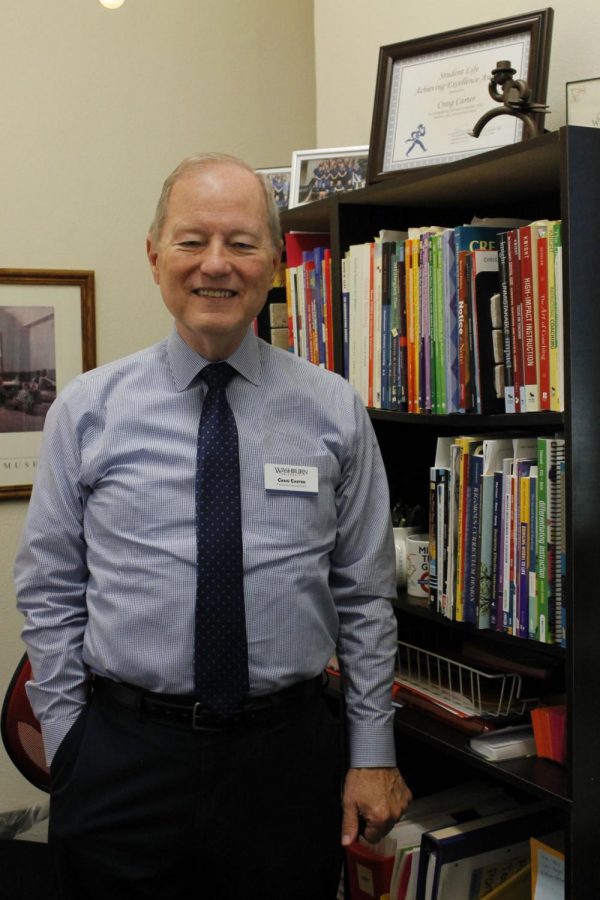Carter holds a true passion for teaching
October 8, 2019
Craig Carter is passionate about teaching – whether it be on the Washburn University campus in front of college students or Covenant Baptist Church teaching preschoolers.
Carter, the director of student field experience and lecturer for the education department, promises that there is no student’s need that is too big or small for his undertaking.
Before coming to Washburn, Carter received his bachelor’s degree from Oklahoma Baptist University and began teaching in Shawnee, Oklahoma at a local public school where he eventually became principal.
“I started out in sixth grade in public school and I taught in college. After I received my master’s, I taught there at the university for a while,” said Carter. “I’ve come full circle, teaching higher education at a university.”
When Carter’s wife went into seminary in Kansas City, they moved to Leavenworth, Kansas, and Carter decided to work on his doctorate at UMKC.
“I loved going to school. I love school and I love everything about the school environment and teaching and learning,” said Carter.
When Carter first came to Kansas 32 years ago, he began working as the principal at a school in Leavenworth. This was the first time he heard of Washburn University.
Carter was interested in the educational background of some of his teachers. He soon realized something they all had in common.
“I realized that they graduated from Washburn University and I had never heard of Washburn before in my life,” said Carter. “It put Washburn in my mind… that it must be a really good school.”
Carter moved from Leavenworth to Wamego and eventually to Topeka where he became a principal in USD 345 in the Seaman School District. It was then when Carter began to interact with Washburn alumni while recruiting teachers from the university.
“I knew Washburn was good but I don’t think I knew how good it was until I came here,” said Carter. “Particularly, our Career Services department… they train our teachers how to interview and create cover letters and resumes.”
Kent McAnally, director of Career Services, has put in the effort throughout the years to look for faculty partners and advocates, like Carter, to aid in the success of students – through the career services department.
“Craig is one of the best of those [faculty partners] because he makes sure that education students are aware and take advantage of what’s available at career services, and that they participate in the events that we create for students,” said McAnally. “So, he’s a huge asset to helping us get the word out about what we do and making sure students [use their available resources].”
Cherry Steffen, professor and chair of the education department, fully appreciates the connections Carter has with local school districts and how it aids in the placement of Washburn’s future teachers.
“He’s made a huge positive impact on the department since he came here. He’s the person that’s responsible for doing all of our field placements,” said Steffen. “He really has streamlined the process. He’s been able to make some contacts that we probably wouldn’t have if not for him.”
Carter found that Washburn University is a great community for learning because education is approached via a collaborative effort.
Carter’s enthusiasm for education, teaching and sharing his passion shows through his work.
“He’s a great teacher and his students know that he cares. He works hard to get students what they need to help them be successful. So, that’s obviously a big part too,” said Steffen.
One area where Carter believes Washburn could improve is making Carnegie Hall handicap accessible.
“I’ve been on my own kind of private campaign about this. I know people have said it’s a historic building and we can’t do anything to it,” said Carter. “There are other historic buildings that have had elevators installed… you have to be careful about the integrity of the building.”
Carter also highlighted the “Washburn University Campus Master Plan” that has Carnegie Hall listed. The document states that the building isn’t expecting any changes until 2020-2022.
Carter explained that each time the plan is published that Carnegie Hall renovations continue to be pushed further back. Carter is upset because he can oftentimes see injured students and faculty having trouble when walking upstairs – Carter mentions this is a daily occurrence.
Additionally, Carter is concerned about a few education students who are wheelchair bound and their ability to access Carnegie. The inability to access the building has forced the department to move classes outside of Carnegie Hall, which houses the department.
“I wouldn’t want anybody to look at this building and say ‘oh I’m in a wheelchair, there’s no way I could be a teacher because I can’t go to the education department,’” said Carter.
Carter feels like there has been little to no attention given to the education department when it comes to the importance of student accessibility. In Carter’s opinion, a department that has a significant impact on every field of study has no voice in the discussion.
In his free time, Carter also enjoys traveling with his wife to visit their grandchildren and reading. Recently, they have also begun to travel abroad during the summer.
“We’ve been to London, and this year we went to Rome, and I think next spring, after graduation we are going to go to Paris,” said Carter. “I’m also an avid reader, I usually read at least a book a week in my free time.”
When Carter isn’t at Washburn, he spends his time teaching Sunday School to preschoolers at Covenant Baptist Church.
“It keeps me grounded to my calling, which is teaching,” said Carter.
Edited by Adam White, Brianna Smith, Wesley Tabor, Jessica Galvin



